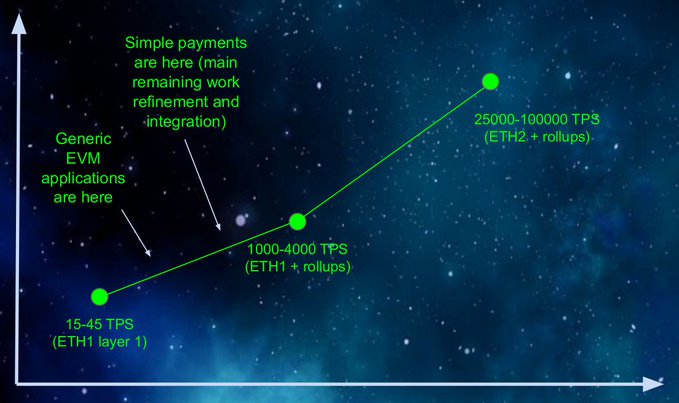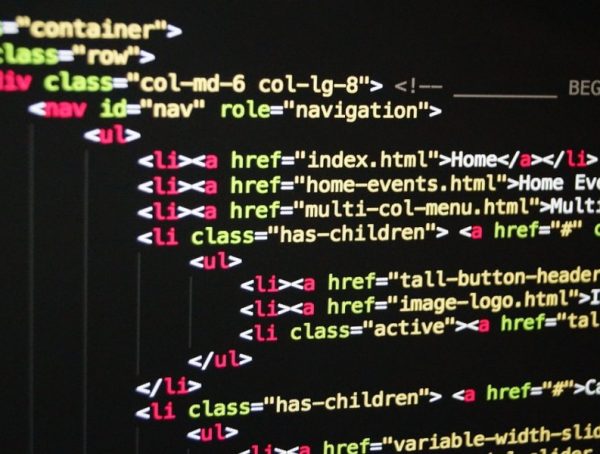In an interesting development, Ethereum co-founder Vitalik Buterin revealed in a tweet thread on Oct 05 that the Eth2 roadmap is getting an update and the scaling improvements might arrive sooner than previously anticipated. The relatively new concept is called “rollups” and it will be combined with sharding to create a synergistic effect to turbo-charge the Ethereum network capacity.
Vitalik Buterin squashed the rumors that sharding was being cancelled for Ethereum 2.0 upgrade, because of the complexity and increasing delays. The suggested rollups can arrive by deployment of Ethereum 2.0 Phase 1 (introduction of sharding and data storage on shards without transaction processing). They can increase the existing 15-45 TPS capacity to 1000-4000 TPS – a 100x increase!

They would work, Vitalik argued, because even though sharded applications require fully deployed Ethereum 2.0 upgrade. The same isn’t true for sharded rollups, which can work effectively with only Ethereum 2.0 Phase 1, since rollups only need the chain for data storage and not computation.
So, rollups on top of sharding can eventually bring the Ethereum network capacity to 25,000-100,000 TPS – an increase of 6400x from this point. However, that itself is likely years away, but we might see the rollups in action as early as 2021.
What Are Rollups?
A Rollup is essentially a Layer-2 scaling solution for blockchains. It’s a sidechain connected to a rather smaller “contract” on the mainnet. It allows for processing off-chain and only using the mainnet for final settlement, relieving network congestion and reducing processing time / fees.
About Ethereum 2.0
Ethereum 2.0 is the next big upgrade for the Ethereum network. It will bring Proof of Stake (POS), eWASM and sharding. It will reduce the resources, required to run the Ethereum network, as well as bring scalability and performance improvements.
The Eth2 upgrade will be implemented in three phases, with the first Phase 0 Beacon Chain, expected by the end of Q2 2020, which will introduce the staking facility. This will be followed by the Phase 1 in Q1 2021, which will introduce sharding and allow data to be stored on shards, however transactions can’t still be processed.
The Phase 2 will make the Ethereum 2.0 truly complete and the network operational, after its introduction at some point in 2022. It will bring the Ethereum WebAssembly (eWASM) replacing the now operational Ethereum Virtual Machine (EVM). Only after the Phase 2 has been rolled out, proper execution of smart contracts and transactions can commence on the new Eth2 chain. The Eth1 and Eth2 chain will gradually merge with each other.
Follow CryptoTicker on Twitter and Telegram for daily crypto news and price analyses!
In order to support and motivate the CryptoTicker team, especially in times of Corona, to continue to deliver good content, we would like to ask you to donate a small amount. Independent journalism can only survive if we stick together as a society. Thank you
Nexo – Your Crypto Banking Account
Instant Crypto Credit Lines™ from only 5.9% APR. Earn up to 8% interest per year on your Stablecoins, USD, EUR & GBP. $100 million custodial insurance.
Ad
This post may contain promotional links that help us fund the site. When you click on the links, we receive a commission – but the prices do not change for you!
Disclaimer: The authors of this website may have invested in crypto currencies themselves. They are not financial advisors and only express their opinions. Anyone considering investing in crypto currencies should be well informed about these high-risk assets.
Trading with financial products, especially with CFDs involves a high level of risk and is therefore not suitable for security-conscious investors. CFDs are complex instruments and carry a high risk of losing money quickly through leverage. Be aware that most private Investors lose money, if they decide to trade CFDs. Any type of trading and speculation in financial products that can produce an unusually high return is also associated with increased risk to lose money. Note that past gains are no guarantee of positive results in the future.
You might also like
More from Blockchain
The Top 5 NFT Marketplaces
Non Fungible Tokens (NFTs) are the next big trend after the DeFi craze. They have been growing in popularity and …
The Top 5 Decentralized Exchanges (DEXs)
The blockchain field and the crypto-verse are witnessing a revolution. This time, it’s the rise of decentralized finance (DeFi) facilitated …
Indorse announces blockchain Hackathon tackling challenges posed by COVID-19
The massive global online hackathon will explore Blockchain technology’s potential to respond to social, healthcare, and economic challenges posed by …





